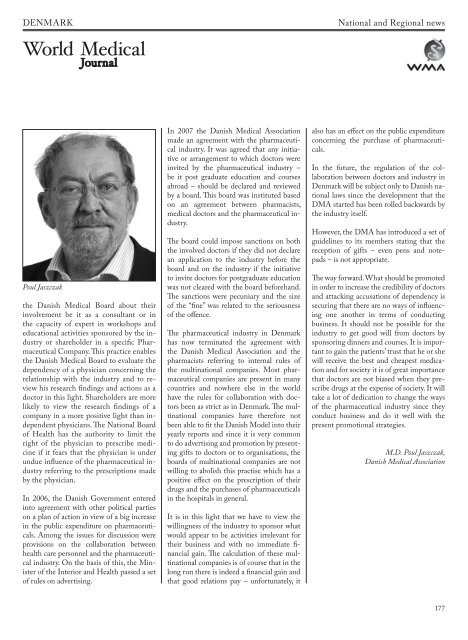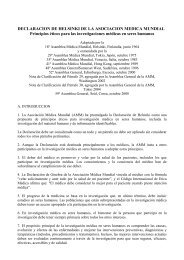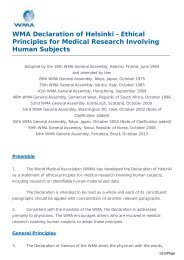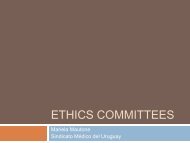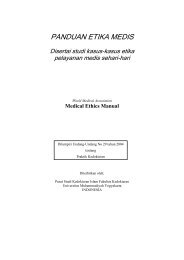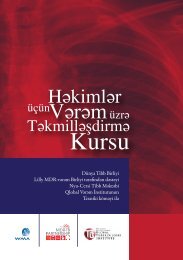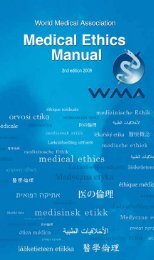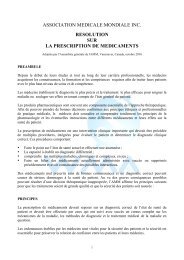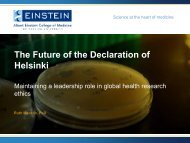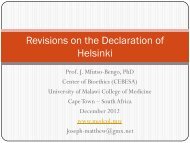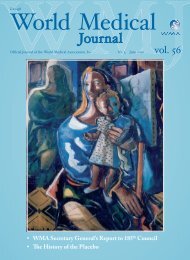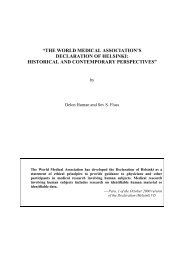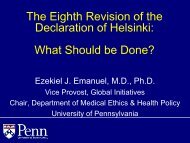WMJ 05 2011 - World Medical Association
WMJ 05 2011 - World Medical Association
WMJ 05 2011 - World Medical Association
You also want an ePaper? Increase the reach of your titles
YUMPU automatically turns print PDFs into web optimized ePapers that Google loves.
DENMARK<br />
National and Regional news<br />
Poul Jaszczak<br />
the Danish <strong>Medical</strong> Board about their<br />
involvement be it as a consultant or in<br />
the capacity of expert in workshops and<br />
educational activities sponsored by the industry<br />
or shareholder in a specific Pharmaceutical<br />
Company. This practice enables<br />
the Danish <strong>Medical</strong> Board to evaluate the<br />
dependency of a physician concerning the<br />
relationship with the industry and to review<br />
his research findings and actions as a<br />
doctor in this light. Shareholders are more<br />
likely to view the research findings of a<br />
company in a more positive light than independent<br />
physicians. The National Board<br />
of Health has the authority to limit the<br />
right of the physician to prescribe medicine<br />
if it fears that the physician is under<br />
undue influence of the pharmaceutical industry<br />
referring to the prescriptions made<br />
by the physician.<br />
In 2006, the Danish Government entered<br />
into agreement with other political parties<br />
on a plan of action in view of a big increase<br />
in the public expenditure on pharmaceuticals.<br />
Among the issues for discussion were<br />
provisions on the collaboration between<br />
health care personnel and the pharmaceutical<br />
industry. On the basis of this, the Minister<br />
of the Interior and Health passed a set<br />
of rules on advertising.<br />
In 2007 the Danish <strong>Medical</strong> <strong>Association</strong><br />
made an agreement with the pharmaceutical<br />
industry. It was agreed that any initiative<br />
or arrangement to which doctors were<br />
invited by the pharmaceutical industry –<br />
be it post graduate education and courses<br />
abroad – should be declared and reviewed<br />
by a board. This board was instituted based<br />
on an agreement between pharmacists,<br />
medical doctors and the pharmaceutical industry.<br />
The board could impose sanctions on both<br />
the involved doctors if they did not declare<br />
an application to the industry before the<br />
board and on the industry if the initiative<br />
to invite doctors for postgraduate education<br />
was not cleared with the board beforehand.<br />
The sanctions were pecuniary and the size<br />
of the “fine” was related to the seriousness<br />
of the offence.<br />
The pharmaceutical industry in Denmark<br />
has now terminated the agreement with<br />
the Danish <strong>Medical</strong> <strong>Association</strong> and the<br />
pharmacists referring to internal rules of<br />
the multinational companies. Most pharmaceutical<br />
companies are present in many<br />
countries and nowhere else in the world<br />
have the rules for collaboration with doctors<br />
been as strict as in Denmark. The multinational<br />
companies have therefore not<br />
been able to fit the Danish Model into their<br />
yearly reports and since it is very common<br />
to do advertising and promotion by presenting<br />
gifts to doctors or to organisations, the<br />
boards of multinational companies are not<br />
willing to abolish this practise which has a<br />
positive effect on the prescription of their<br />
drugs and the purchases of pharmaceuticals<br />
in the hospitals in general.<br />
It is in this light that we have to view the<br />
willingness of the industry to sponsor what<br />
would appear to be activities irrelevant for<br />
their business and with no immediate financial<br />
gain. The calculation of these multinational<br />
companies is of course that in the<br />
long run there is indeed a financial gain and<br />
that good relations pay – unfortunately, it<br />
also has an effect on the public expenditure<br />
concerning the purchase of pharmaceuticals.<br />
In the future, the regulation of the collaboration<br />
between doctors and industry in<br />
Denmark will be subject only to Danish national<br />
laws since the development that the<br />
DMA started has been rolled backwards by<br />
the industry itself.<br />
However, the DMA has introduced a set of<br />
guidelines to its members stating that the<br />
reception of gifts – even pens and notepads<br />
– is not appropriate.<br />
The way forward. What should be promoted<br />
in order to increase the credibility of doctors<br />
and attacking accusations of dependency is<br />
securing that there are no ways of influencing<br />
one another in terms of conducting<br />
business. It should not be possible for the<br />
industry to get good will from doctors by<br />
sponsoring dinners and courses. It is important<br />
to gain the patients’ trust that he or she<br />
will receive the best and cheapest medication<br />
and for society it is of great importance<br />
that doctors are not biased when they prescribe<br />
drugs at the expense of society. It will<br />
take a lot of dedication to change the ways<br />
of the pharmaceutical industry since they<br />
conduct business and do it well with the<br />
present promotional strategies.<br />
M.D. Poul Jaszczak,<br />
Danish <strong>Medical</strong> <strong>Association</strong><br />
177


